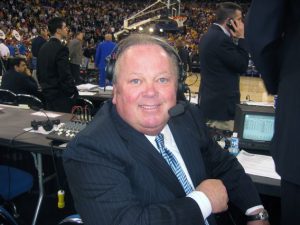Image by Samuel Morazan from Pixabay
Editor’s Note: The following contains sagacious career advice by the late longtime sportscaster, Chris Roberts, for young people aspiring to be broadcasters. Chris passed away in 2023. For 23 years he was the voice of the UCLA Bruins’ football and basketball games. Chris retired in 2015. He and I were once co-workers at a successful radio station in southern California. Before he retired we sat down in 2010 to talk about broadcasting and tips for young broadcasters.
Decision-makers at the Pac-12 probably once considered it a birthright to promote the conference as the “conference of champions.” (That was before 10 schools left the conference effective in 2024.)
The same is true off the field. Broadcasters in the Pac-12 conference have also been champions.
Consider the depth of respect the former longtime UCLA play-by-play announcer, Chris Roberts, paid to his peers in the Northwest who have retired.
 Courtside: the late Chris Roberts, UCLA play-by-play announcer
Courtside: the late Chris Roberts, UCLA play-by-play announcer
“Bob Rondeau, with more than 20 years as the voice of the Huskies, is unquestionably one of the best and most recognizable voices in the Pacific Northwest while Bob Robertson with his 40 years calling WSU football is the dean of Pac-10 play-by-play men in the conference,” said Chris Roberts, the voice of the UCLA Bruins. “They are both solid announcers and very good broadcast friends of mine.”
Such positive comments were vintage Chris. He called UCLA’s football and basketball games on UCLA’s network. The flagship station is KLAC in Los Angeles.
Chris hadn’t changed since I worked with him long ago at a southern California radio station from 1970 to 1971.
We had monster ratings at KFXM, a rock n’ roll radio station in the Riverside-San Bernardino region, one of the nation’s top 30 markets. KFXM and its sister station, KDUO, had an astronomical 55 percent share of the listening audience.
Chris was KFXM’s noon to 3 p.m. rock jock and I was the newscaster on both stations in morning and afternoon drive-time.
As he does now, Chris wore an enthusiastic smile, and he was analytical as the station’s music director. He had a knack for picking the right music for KFXM listeners. The playlist included artists from the Rolling Stones to the Supremes.
I’ll always remember overhearing him in the hallway explaining why the night-time ratings were so good; he successfully anticipated that Motown tunes would especially appeal to KFXM’s night-time listener demographics.
Chris and I agree that KFXM was a dynamic, fun experience. The now-defunct station served as a springboard for other successful broadcasters.
For me, there were eye-opener incidents, such as when I spotted a pre-Rolling Stones star – former artist Freddie “Boom Boom” Cannon – sitting in the lobby waiting to pitch Chris songs from Buddah Records. Cannon had stopped recording for a while after a string of hits that had been influenced by Chuck Berry.
It suggested to me that life was tough and it was necessary to adapt in order to earn a living.
Our careers took different paths:
Chris worked at top Los Angeles radio stations before being hired to broadcast UCLA’s games.
(My career took me to different markets at various TV and radio stations before I attended the UCLA Executive MBA Program and segued to a career in business. Insights gained at KFXM helped me as a journalist; as a radio station programmer in achieving high ratings in different formats, from all news to adult contemporary; and in business, especially marketing.)
Chris and his wife, Ann, have a son, David, and a daughter, Nichole. Nichole taught Spanish in public schools. On game days, David served as the UCLA spotter and locker-room coordinator.
Chris and I sat down for breakfast at a Bellevue, Wash., restaurant in just before a football game between the Bruins and University of Washington Huskies.
Including tips for young broadcasters and businesspeople, here are his edited comments:
Q: How does it feel doing play-by-play for a top university on KLAC, a Clear Channel radio station in the nation’s No.2 market?
A: As time goes on, there isn’t a day I don’t wake up appreciating and recognizing I’m one of the luckiest guys in America. I never take it for granted.
Q: What is your broadcasting philosophy?
A: It’s real simple – be professional in every aspect of the job. I once did Long Beach State football. George Allen gave me an important lesson about small things like providing pencils in the press room. He said you have to take care of every minute detail. If you don’t, then you’ll let other things slide.
(Allen, as a Pro Football Hall of Fame coach, never had a losing season. He had the NFL’s third-best won-lost record behind Vince Lombardi and John Madden, respectively.)
Q: In addition to your sports career, you have a real estate broker’s license, and obtained it when you were on-on-the-air at our powerhouse radio station. Why?
A: I was influenced by KFXM owner Howard Tullis at a young age. He taught me valuable lessons after I asked him for advice. He told me that when I got my first paycheck, to make the first payment to my savings account. Then he told me to save my money and he insisted that I save as much as possible.
Soon, I had saved up about $5,000. I really didn’t know what I was doing. I bought a four-unit complex for $44,000 with a $4,400 down payment and the owner carried a second. I sold it two years later for $88,000.
Q: Why and how did you get into sports broadcasting?
A: I played three sports in high school. In college, I studied at Cal Poly Pomona. While at KFXM, I started doing the high school game of the week on a cable channel, Teleprompter, which was owned by Jack Kent Cooke. (Cooke also owned the Washington Redskins and Los Angeles Lakers.)
Q: What counsel would you give a young broadcaster?
A: I enjoy helping young people. I ask them if they’re willing to work for low wages and go out to the desert for their first job. Then I tell them they can work their way up by making audition tapes and applying to stations in larger markets.
I remind them to stay optimistic and don’t get disappointed by only one person’s opinion. You have to put it aside. Don’t get caught up in that negativity.
Q: What’s your career advice for a young businessperson?
A: The first thing you’ve got to do is don’t live beyond your means. Avoid credit card debt and ask yourself if you really want to buy that big car or television. Debt is a killer.
I believe the Golden Rule is very important: do unto others as you want to be treated. Another philosophy of mine is to be grateful for opportunities.
Q: Hobbies?
A: I play golf early every Sunday morning with my longtime friends.
Q: Ron Fairly surprisingly announced his retirement from the Seattle Mariner broadcasts at the age of 68. How long do you intend to broadcast games?
A: That’s a surprise.Fairly is really good and at the top of his game. I intend to keep working as long as possible. It’s a lot of fun. They’ll have to drag me away.
Finally, in case you’re wondering, the UCLA announcer’s favorite music: Tunes by Chicago.
P.S. Another friend, former Los Angeles sportscaster Randy Kerdoon, and co-worker when I was in broadcasting, is one of the most unique persons you’ll ever meet. He also shares his career insights here.
From the Coach’s Corner, lessons in sports are analogous to lessons in business:
A sports team will often lose because of a lack of effort, poor strategy, failure to adapt, and mistakes on offense and defense.
Music retailer, Tower Records, was an international powerhouse when I worked with Chris Roberts. But it became a non-player after a federal bankruptcy judge has approved the sale of the company to Great American Group for $134.3 million in 2006. Great American liquidated Tower Records and 3,000 people lost their jobs. Basically, it’s now an online music store.
The demise of Tower Records was caused by several reasons:
- The company’s name was out-of-date. By way of comparison, consumers now know Kentucky Fried Chicken as KFC.
- Tower Records didn’t adapt its business model. Founder Russ Solomon failed to understand the viability of the Internet. He was widely quoted as dismissing it as both a threat and opportunity.
- Pricing points drew criticism from shoppers.
- The stores weren’t inviting.
- Many consumers complained about the lack of customer service.
So, you might want to consider these questions:
- How is your company perceived?
- How will you succeed like a championship sports team?
For strategic-planning tips, here are numerous business-coaching columns on planning.
“Failing to plan is planning to fail.”
–Alan Lakein
__________






